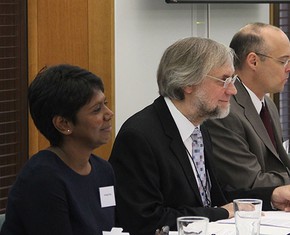The views expressed in our content reflect individual perspectives and do not represent the authoritative views of the Baha'i Faith.
Have you ever spent any time in a major port city, and watched the big container ships come in? They cross the world’s oceans to bring us our stuff.
Since the world’s major manufacturing centers increasingly exist in low-wage countries, those container ships come from China and Taiwan and Vietnam and South Korea and a whole host of other places to deliver us our new cellphones, our flat screen TVs, our plastic dogfood dishes and our cars. Look around your home, and you can probably count many, many products that made a long sea voyage on one of those huge ships to get to you—if you live in the developed world, that is.
We call that movement of goods international trade.
The controversial subject of trade has taken over our political campaigns and our news sources these days. Because so much of the world’s manufacturing base has moved to low-wage countries, where goods can be made more cheaply, people with manufacturing jobs in higher-wage countries have suffered, and they aren’t happy about it. This has created a big backlash against trade agreements, and a call for tariffs on goods from low-wage countries.
 Beyond all that, as many economists and trade experts have pointed out, we now live in a world where our stuff can readily move across national borders—but because of citizenship and immigration laws, the people who make that stuff can’t. This tilts the playing field unfairly in favor of large corporations.
Beyond all that, as many economists and trade experts have pointed out, we now live in a world where our stuff can readily move across national borders—but because of citizenship and immigration laws, the people who make that stuff can’t. This tilts the playing field unfairly in favor of large corporations.
Large, multi-national corporations have virtually unregulated political and economic power; and those corporations often have no motive other than maximizing their profits. That means they can despoil the environment, use their economic power to unduly influence or bribe governments, and exploit the workers they hire in those low-wage environments.
In a few sentences, that briefly summarizes the view of what we now call “the anti-globalization movement,” which opposes unfair trade agreements between nations that allow so-called “market fundamentalism” and unregulated capitalism to rule our economic lives.
The term “anti-globalization” doesn’t really describe that movement well, however. Activists who work to change the conditions imposed by market fundamentalism advocate for increased human rights, democratic processes, environmentally-sustainable development and fair trade policies—which really call primarily for better global integration, equity and fairness. Anti-globalization advocates aren’t generally opposed to trade or globalism itself—instead, they ask that we end the exploitation, child labor, sweatshop conditions, job losses and human rights violations that often go along with so much market fundamentalism and unrestricted multinational capitalism.
Solving these kinds of worldwide issues requires a new global paradigm. Of course, all of those issues trace back to the basic system of national sovereignty the world now has in place, so it makes sense to consider the root cause in a new way—as an obsolete mechanism that needs replacement.
Since manufactured goods can move anywhere but labor can’t, we’ve installed a modern, multilateral and multinational system of trade—but we still have an ancient, border-bound and restrictive system of migration, where low-paid workers cannot follow jobs that will improve their lives, and have instead become virtual prisoners of their own nations and their policies. We will never have fair trade without an equal level of fairness and mobility for those workers who make international trade possible.
Shoghi Effendi, the Guardian of the Baha’i Faith, called this current state of affairs “a narrow and brutal nationalism,” and said that the healthy flow of international trade, which has lifted billions of people out of poverty, could only be hampered by levying prohibitive tariffs:
…a narrow and brutal nationalism, which the post-war theory of self-determination has served to reinforce, has been chiefly responsible for the policy of high and prohibitive tariffs, so injurious to the healthy flow of international trade and to the mechanism of international finance, is a fact which few would venture to dispute. – Shoghi Effendi, The World Order of Baha’u’llah, p. 35.
So what’s the solution? It’s actually quite simple in concept: apply Abdu’l-Baha’s advice about assisting in “the eventual application of the principle of federalism” underlying the American government to “the relationships now existing between the peoples and nations of the world.” – Ibid., p. 37.
Try to imagine it: a world where the free flow of goods and labor could occur across all borders, just as that unrestricted flow occurs now between the fifty states of the United States. New Yorkers don’t pay any tariff when they buy an item manufactured in Indiana, for example; and anyone from any state in the U.S. can freely move to any other state to search for a new job or a new business opportunity. How could that principle work across the globe? According to the Baha’i writings:
…the first divine teaching is that communities must be freed from racial, political and even patriotic prejudice, that all men are of one race and the whole universe one land. Consider how unwise and short-sighted are the leaders, the politicians and the philosophers of the present age! …The inhabitants of countries are so immersed in their imaginations that they have carved for themselves statues of imagination, which they worship, when actually they are naught but fantastic images, yet in spite of that they are worshipped by everyone. How heedless, unintelligent and unwise are the leaders and philosophers of today!
In short, the divine teachings constitute the uni-coloured pavilion of the oneness of the world of humanity. All the peoples of the world shall not attain unto rest except under its shadow, and in accordance with these teachings, the Turk as well as the Tajik, the European as well as the American, the Asiatic as well as the African—all shall rest under the shadow of this pavilion. The friends of God must therefore deal with all the communities of the world with the utmost truthfulness and friendship without any distinction of race, so that all may embrace one another and with the utmost harmony and love may engage in the glorification of the Lord of the Kingdom. – Abdu’l-Baha, letter to an individual, Star of the West, Volume 6, p. 122.
















Comments
Sign in or create an account
Continue with Googleor